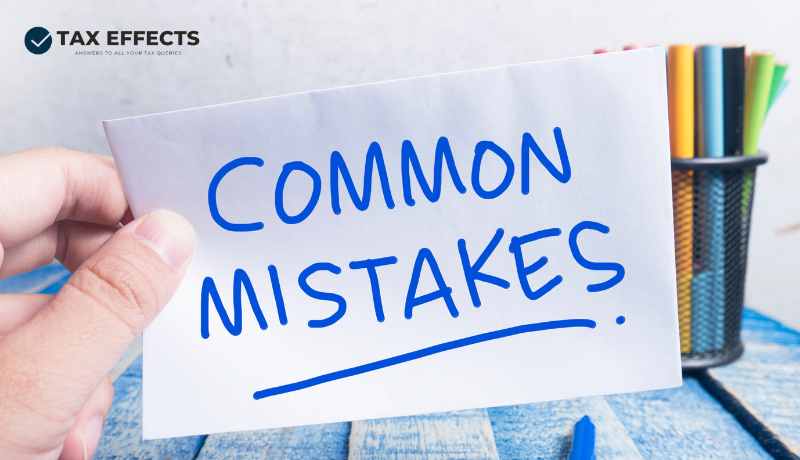In this article, we will discuss about common investment mistakes investors should avoid while making investment.
Common Investment Mistakes Investors should avoid while making Investment are
1 Not Investing
Of all of the mistakes that a beginner investor might make on their investing journey is not investing. Retirement is expensive & unfortunately, most of us won’t be able to save enough without a lot of help from the stock market.
If you had invested that money in the stock market and it was allowed to compound, meaning you earned interest on your interest. The same amount of money contributed throughout your life would be significantly higher by investing in the stock market instead of any fixed or low return investing instruments.
2. Using money you can’t afford to risk
When you invest money that you cannot afford to risk, your emotions and stress levels get higher, which can lead to poor and impulsive investment decisions. When evaluating stocks, consider your risk tolerance, which is your willingness to lose a portion or all of your original investment in exchange for higher returns.
When determining your risk tolerance, evaluate the securities or asset classes you’re comfortable with, such as growth stocks v/s bonds v/s fixed savings instruments. Don’t invest money you can’t afford to lose, such as your emergency funds. You will make much better investment decisions by investing money that you can afford to risk.
3. Being driven by Impatience
Another investing mistake is a lack of patience. If you’re investing for the long term, stocks may not experience the desired gains right away. If a company’s management team unveils a new strategy, it may take months or several years for that new approach to play out.
Too often, investors will buy shares & then immediately expect the shares to rise at highest level. What often makes investing profitable is the magic of compounding. Compounding takes time to really work, which is why those who start saving at young age (in their early 20s) often see the best returns.
4. Learning about shares & stock knowledge from the wrong places & following the crow
Getting stock, shares tips or information from the wrong sources is another common and costly investing mistake. Following the crowd is an investing mistake since it doesn’t involve research but instead mirrors what other investors are doing.
Many people only hear about an investment after it has already performed well. If certain stocks double or triple in price, the mainstream media tends to cover those moves as hot takes. Television, Newspaper & the Internet (including social media) can push stocks higher into excessively overvalued territory.
There is no shortage of experts in the stock market who are willing to offer their opinions while presenting them as if they are educated and endlessly correct. Even stock analysts that work for investment firms get it wrong and usually have a solid grasp of the company and the industry they cover.
In other words, even if they’re qualified to render an opinion, they can still be wrong. Generally, government-backed reliable sources is a good place to start for general investment advice or guidance. You could also consult a financial advisor to guide you through the process. Not even the most experienced and successful investor can predict the future. If an investment professional guarantees a certain outcome on your investment, consider it a red flag.
5. Not doing your due diligence
Not performing due diligence when investing can be a costly mistake. With a proper due diligence strategy Investors are more likely not to be blindsided and make well-evaluated investment decisions.
An individual investor should perform proper due diligence especially with highly speculative and volatile penny stock shares. The more due diligence, the better your investing results. If you’ve reviewed the company, including any warning signs and potential risks, you’re much less likely to be negatively surprised by an event.
6. Investing without goal & understanding of your risk profile
Setting goals is extremely important. Once you set a goal, you are determined and focused to achieve it. Goal-setting restructures your brain cells in order for you to be more successful in achieving them. Your brain tries to bring down all possible obstacles that keep you away from achieving these goals.
Once you set a goal, like buying a house or going on vacation to your favorite destination, you are less likely to miss your SIPs or tamper with your savings. Because, suddenly, you feel like these goals matter to you the most.
As important as it is to set a goal, understanding your risk profile is equally important. Different investment options have different risk profile. Understanding the risk of investing in different categories of investments will allow you to understand your risk profile in a better way.
An equity-oriented portfolio will have more risk than a debt-oriented portfolio or a fixed investment portfolio.
7. Try to time the market
Market timing is generally prevalent amongst stock market investors, where they make buying and selling decisions based on their predictions about the future market price movements.
Many investors also try to time the market. They try to sell off their investment when they feel the market is going to crash. These predictions might not always be true. Many researchers and experts say it’s impossible to time the market.
Moreover, trying to time the market leads to your goals not getting realized. The reason being, by redeeming your investment from time to time, whenever you feel, the market is going to crash, you are missing out on opportunities like the benefit of compounding that lets you reach your goal faster.
8. Reshuffling your investments too often
By looking at the returns or a promising headline, makes a lot of investors sway towards doing the same thing. Many investors make the mistake of falling into this trap too often. Based on the predictions based on headlines and by following the crowd, they try to reshuffle their investment portfolio too often, attracting exit loads, which eventually eats into your overall returns.
Frequent churning of the portfolio also hampers the growth potential of investments. This is because some funds, like equity funds perform well only in the long run.
Frequent churning would make you lose out on time and bring you back to where you started. So, it will take you more time to realize your goals & also you will miss out on various opportunities that happened during the time frame.
9. Not considering the impact of inflation on returns
One of the common mistakes that most investors tend to make is to ignore the effect of inflation on returns. We all know that the value of the rupee is not the same as what it was 10 years ago. It’s worth was way more than what it is today.
And after a few years, it will decrease even further. It’s almost inevitable. In other words, inflation bites into the value of the rupee and decreases its purchasing power. So, while making any investment, your main aim should be to fetch returns that beat inflation.
For example: let’s say you invest in a Public Provident Fund (PPF), which gives a return of 7.10% and the rate of inflation is 6%. Here, the real returns that you earn are only 1.10%, which is very low. Thus, it is very important to understand the impact of inflation and invest in products that can give you high return from rising inflation.
Mutual Fund & Shares are such product that can help you beat inflation and generate good returns for you. Always remember, it’s always the inflation-adjusted returns that count. Returns after accounting for inflation are the real returns earned by you.
10. Stop investing when the markets are down
Due to COVID crisis, global markets along with Indian markets took a toll. As a result, many investors panicked & stopped their SIPs. That’s a really dangerous practice.
What investors forget is that the losses you see as a result of market crash are paper losses and not actual losses. It becomes an actual loss only when you withdraw your investment. You should never do that. Markets are cyclical in nature. It’s not that a bad cycle is going to stay forever.
Eventually, markets will correct itself and your investment value will rise. Market corrections happened and are on an upward trend again.
By stopping your SIPs when the markets are down, you also lose out on the benefit of rupee cost averaging. When you invest in SIPs, you are investing a fixed amount every month at a particular date.
The number of units of the scheme you get depends on the day’s NAV. when the markets are down, the latest NAV of fund you invest in will be low. This means that you’ll get more units of the fund on the day of your SIP installment.
Similarly, when the markets are in a good shape, you’ll get more units of the fund due to an increase in NAV. This phenomenon will bring down your average cost of returns thereby shooting up your total returns. Thus, stopping your SIPs will deprive you of benefiting from this advantage.
11. Not diversifying enough
Another common mistake that investors make is to invest a large chunk of their capital in buying stocks of only one kind or of a single company and then incur a loss when the portfolio goes down.
Diversification spreads out your risk; it makes sure if some stocks are going down, others gain and nullify your loss, so your portfolio remains balanced.
12. Refuse to book loss & having short term focus mentality
Beginners tend to hold stocks and financial assets even when they’re not performing well. If a stock’s value is degrading, many first-time investors and amateur traders are prone to refraining from selling the asset hoping that its value would shoot back up in due time.
In most cases, this may never happen, leaving investors with significant losses. You could set a limit for losses, beyond which you will have to sell off a loss-making stock, thus limiting your capital erosion.
In the end, the idea that investing in financial assets or trading in equity makes you richer quickly, limits your focus towards the future, thereby stopping you from thinking about the long-term effect of your investment decisions. This could be extremely damaging to your financial future.
To make steep profits in a short period, many first-time investors make rash and uninformed decisions, generating more losses than profits. Write your short-term goals and your long-term goals & make a plan for the future. Pick an investment strategy including pointers and guides for the long run.
Additionally, ensure that you have at least some long term (usually 5 to 10 years) investments in your portfolio to maximize your profits.
Happy Readings!
Disclaimer: The information contained in this website is provided for informational purposes only, and should not be construed as legal/official advice on any matter. All the instructions, references, content, or documents are for educational purposes only and do not constitute legal advice. We do not accept any liabilities whatsoever for any losses caused directly or indirectly by the use/reliance of any information contained in this article or for any conclusion of the information.









